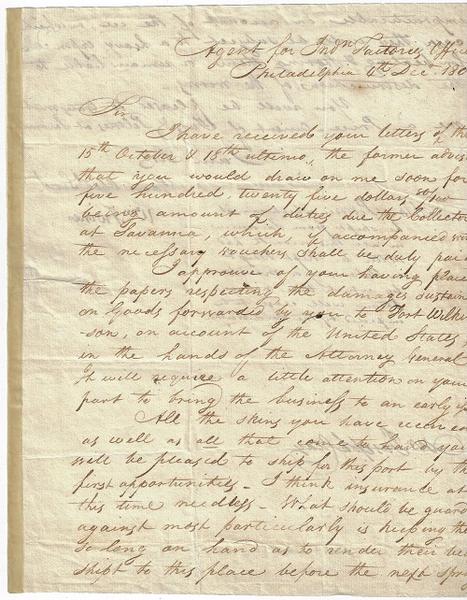Shipping of "All The Skins You Have Received".

(Trading with Indians) Irvine, William. A two page letter dated December 6th, 1801 sent by William Irvine, the agent for India Factories Office to Joseph Clay, a trader with various Indian tribes. The letter is concerned with Clay’s shipping of “all the skins you have received.”
(Letter in full as written.)
Agent for Indn Factorie Office
Philadelphia 6th Dec. 1801
Sir,
I have received your letter of the 15th October & 18’th ultimo, the former advising that you would draw on me soon for five hundred twenty five dollars, 80/100 being amount of duties due the Collector at Savanna, which, if accompanied with the necefsary voucher, Shall be duly paid.
I approve of your having placed the papers respecting the damages sustain’d on goods forwarded by you to Fort Wilkinson, account of the United States, in the hands of the Attorney General; He will require a little attention on your part to bring the businefs to an early ifsue.
All the skins you have received as well as all that come to hand you will be pleased to ship for this port by the first opportunity,- I think insurance at this time needlefs. What should be guarded against most particularly is keeping them So long on hand as to render their being Shipt to this place before the next Spring impracticable on account of the ice, in which case they will be subject to a heavy expence for heating & Storing them, or remain liable to the destination of the monny.
You will be pleased to transmit me a Price – current of Furs & Peltes at Savanna.
I am ___
Your Obed’t Serv’t
Wm Irvine
Peltries which cannot be kept shipt from Savanna in all this month had better be kept & Shipt in February or March by which time navigations will cease to be impared by the cold weather.
Wm Joseph Clay
Seeking to facilitate trade with the Indians, Congress authorized in 1796 the establishment of “permanent trading houses, at which all transactions with the Indians were to be carried on by the government agents. In 1800 two such houses were established, one at Coleraine on the frontier of Georgia and the other at Tellico Blockhouse on the border between Tennessee and the Cherokee Nation. Bright seemed the prospects for these factories and Secretary of War Dearborn confidently reported to the president that ‘The intercourse
which grows from such establishments has a powerful tendency towards strengthening and confirming the friendship of the Indians to the people and the government of the United States, and towards detaching them from the influence of neighboring governments.’” -Mississippi Valley Historical Review 222, September, 1919.
Neatly repaired on the left side, very legible and in vg cond.
